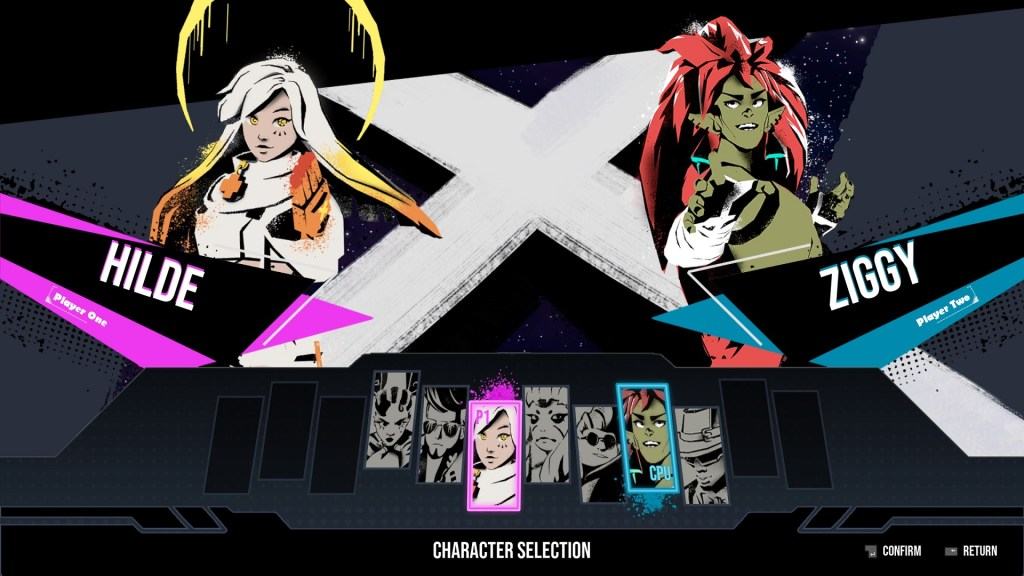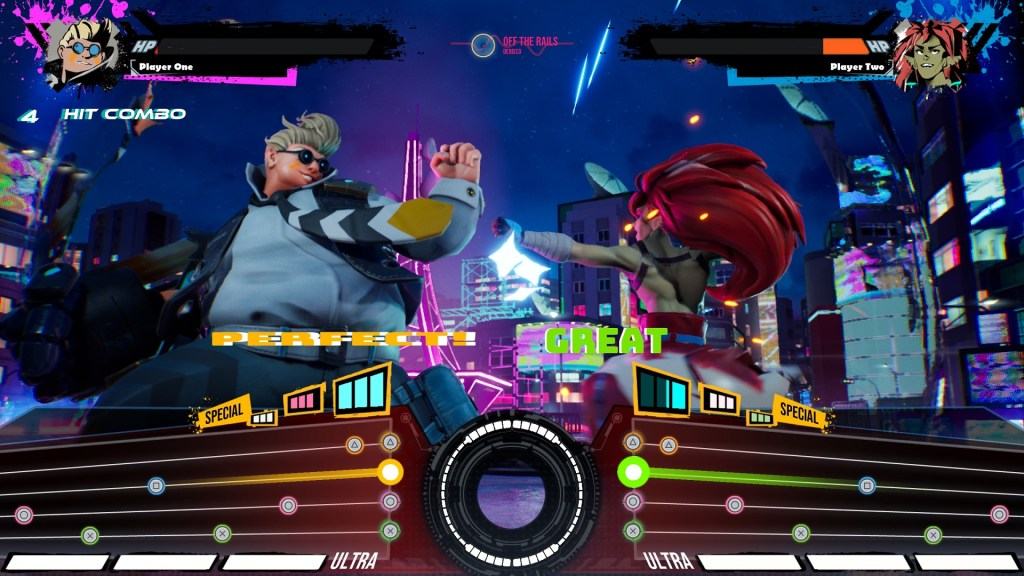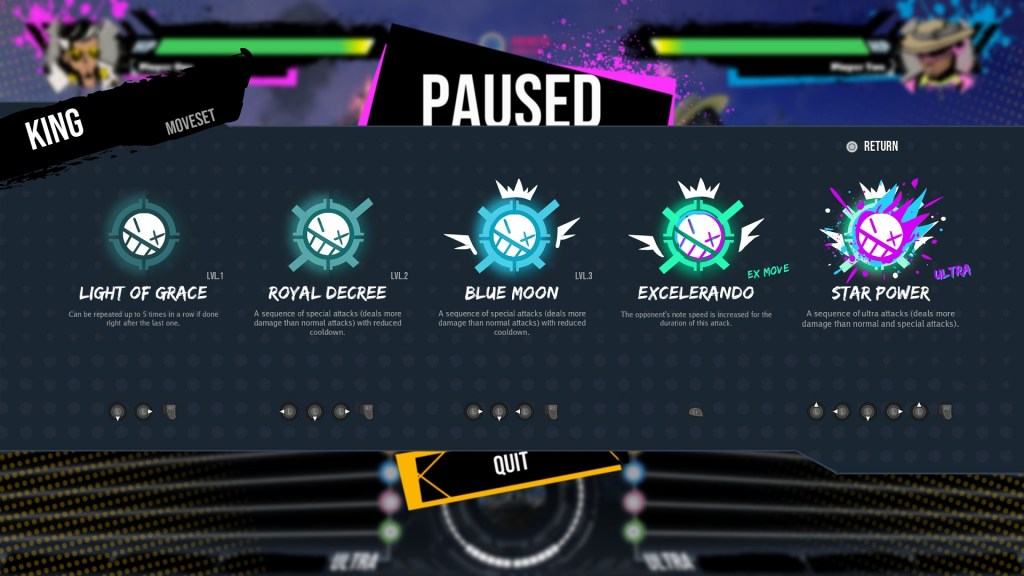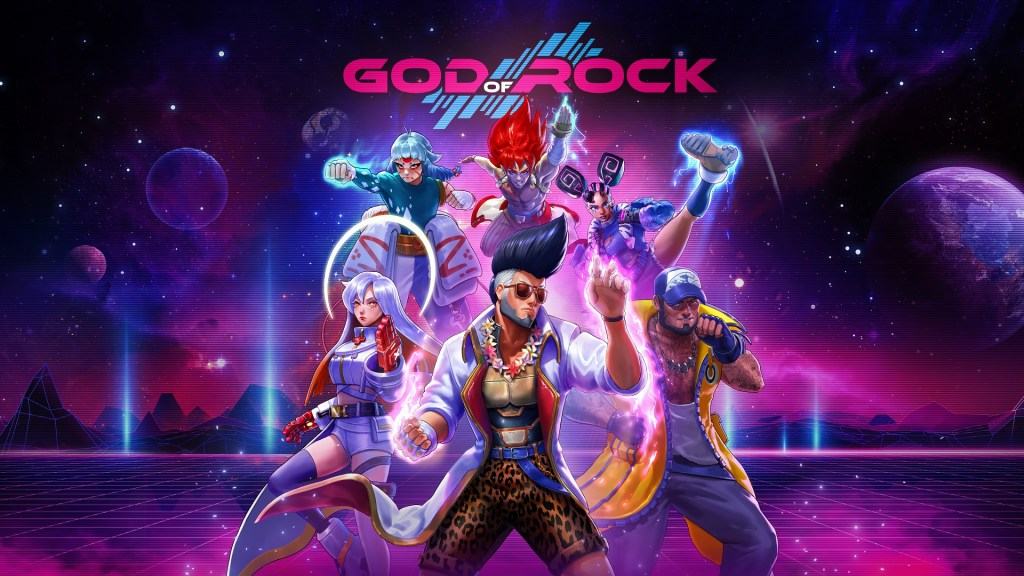Preview: God of Rock
Rhythm games are kind of my passion. If I’m not busy pouring time into a JRPG (or wasting away my days in Final Fantasy XIV), you can usually find me jamming away in some sort of musical experience. Project Diva, DJMax, Taiko no Tatsujin…hell, even music adjacent games like Tetris Effect get a ton of my attention. So when a new rhythm game is announced, particularly one trying to do something unique, I pay attention.
Enter God of Rock, an upcoming title from Modus Games. This a title that is attempting something very unique, blending a rhythm game with a genre on a completely different end of the spectrum – fighting games. We had the opportunity to try out an early build of this title, and I’ve come out the other end feeling a bit…well, disappointed.
The core of the game is rhythm gameplay. You go up against an opponent, either computer-controlled or another real player, both playing the same notechart of a selected song. The notechart gets more complicated as it goes on, and the goal is to survive longer than your opponent. Special moves can be used to screw with your opponent’s chart – changing the speed, making notes blink, etc – making God of Rock feel a lot like the battle mode from Guitar Hero III.
The fighting game aspects come from the different selectable characters, as well as the way special moves are used. Each character you can select has some kind of special gimmick – one focuses on healing herself, another is all about decreasing the cooldowns on their special moves. Figuring out how to use each character’s moveset is key to winning a match here, as just playing the rhythm game notechart perfectly isn’t going to cut it.

Special moves are activated by inputting fighting game-style combos during gameplay. Each character has three different sets of specials: a core three that are powered using quickly-replenishing energy bars, an “EX” move that’s activated using a second bar, and an ultimate move that is charged up with a full EX bar.
And this is where we enter my first issue with the game as is: there is way too much to keep track of for a rhythm game. Rhythm games typically demand focus on their notecharts, and maybe a single special powerup bar depending on the game. The goal is to play perfectly, after all. But with God of Rock, you have to keep track of FOUR energy bars while also playing the notechart.
Activating special moves also pulls the player away from the notechart as well. Most rhythm games that have some kind of activatable special let you use it with a single button press or motion. Here, thanks to the fighting game juice being injected, you have to input a directional combo with the analog stick and then pull a trigger to activate a move, all of which must be done in between notes if you want to keep your combo.
After some time with this game, I came to realize – God of Rock doesn’t really want you to play it as a rhythm game. Yes, you have to play the incoming notes if you want to survive, but beating your opponent effectively usually means purposely ignoring some notes in order to activate some combo moves. If you try to wait for downtime in a notechart, your opponent will be laying the smackdown on you instead.
This was further reinforced when I entered the two-to-three minute part of any given song, when the notechart really ramps up difficulty – I was being thrown note combos that just don’t make sense on a controller. One chart was asking me to perform square/circle and cross/triangle inputs, which just signals bad charting to me. I presume this was done on purpose, to force players to start missing notes and lose health.

Unfortunately, the fighting game aspects aren’t exactly notable either, particularly when it comes to character movesets. While this is an early build of the game, it was obvious that some characters available to play had much more love put into their movesets than others. My favorite character was probably Hilde, whose moveset is focused on self healing and defensive play. To be fair, though, this self healing focus meant I could just focus on the rhythm gameplay and pop a heal whenever I took bad damage, winning most fights by attrition.
Kosaku is another interesting one. Out of the available seven in this early build, Kosaku’s moveset seemed the most unique and robust. He has two different “stances,” switched between via his EX move, and each stance offers a different set of special attacks. The attacks synergize off each other (a special performed in one stance is more powerful if used after another used in his other stance) and I feel like he could be fun to play against real opponents once you’ve mastered his moveset.
But then we get characters that feel completely forgotten. Tophat, who has one attacking move and every single other special is “reduces the cooldown on your other specials.” So you can cool down your cooling-down cooldown to cool down his one attack before it goes into cooldown. There’s also King, because every rhythm game needs an Elvis impersonator. Most of his special moves are described as “a sequence of special attacks.” Nothing interesting, nothing affecting your opponents notechart or giving you some kind of buff, just “input this command for damage.”

Putting all of the above together, every fight became “spam specials to win” for me. I had no trouble with the notecharts, and honestly little trouble weaving in the special move commands between notes, and was able to win a good 95% of the matches I played against the computer on standard difficulty. The only time I had trouble was when I was playing a faster-paced track against an opponent whose special is “add random extra notes to your notechart.”
Overall, the mashup God of Rock is going for feels half hearted. On the rhythm side, the charting is messy, and the game feels like its encouraging players to outright ignore it at times in favor of using special attacks. On the fighting game side, some characters obviously got much more attention than others when building their move sets, causing others to just feel boring to play.
I can only hope that some of these issues are planned to be fixed for the game’s official launch on April 18th, 2023. Until then, I think I’m going to stick to playing more DJMax.
Preview copy provided by Modus Games for PC. Screenshots taken by writer. Featured image courtesy of Modus Games.
Search for:

Rhythm games are kind of my passion. If I’m not busy pouring time into a JRPG (or wasting away my days in Final Fantasy XIV), you can usually find me jamming away in some sort of musical experience. Project Diva, DJMax, Taiko no Tatsujin…hell, even music adjacent games like Tetris Effect get a ton of my attention. So when a new rhythm game is announced, particularly one trying to do something unique, I pay attention.
Enter God of Rock, an upcoming title from Modus Games. This a title that is attempting something very unique, blending a rhythm game with a genre on a completely different end of the spectrum – fighting games. We had the opportunity to try out an early build of this title, and I’ve come out the other end feeling a bit…well, disappointed.
The core of the game is rhythm gameplay. You go up against an opponent, either computer-controlled or another real player, both playing the same notechart of a selected song. The notechart gets more complicated as it goes on, and the goal is to survive longer than your opponent. Special moves can be used to screw with your opponent’s chart – changing the speed, making notes blink, etc – making God of Rock feel a lot like the battle mode from Guitar Hero III.
The fighting game aspects come from the different selectable characters, as well as the way special moves are used. Each character you can select has some kind of special gimmick – one focuses on healing herself, another is all about decreasing the cooldowns on their special moves. Figuring out how to use each character’s moveset is key to winning a match here, as just playing the rhythm game notechart perfectly isn’t going to cut it.

Special moves are activated by inputting fighting game-style combos during gameplay. Each character has three different sets of specials: a core three that are powered using quickly-replenishing energy bars, an “EX” move that’s activated using a second bar, and an ultimate move that is charged up with a full EX bar.
And this is where we enter my first issue with the game as is: there is way too much to keep track of for a rhythm game. Rhythm games typically demand focus on their notecharts, and maybe a single special powerup bar depending on the game. The goal is to play perfectly, after all. But with God of Rock, you have to keep track of FOUR energy bars while also playing the notechart.
Activating special moves also pulls the player away from the notechart as well. Most rhythm games that have some kind of activatable special let you use it with a single button press or motion. Here, thanks to the fighting game juice being injected, you have to input a directional combo with the analog stick and then pull a trigger to activate a move, all of which must be done in between notes if you want to keep your combo.
After some time with this game, I came to realize – God of Rock doesn’t really want you to play it as a rhythm game. Yes, you have to play the incoming notes if you want to survive, but beating your opponent effectively usually means purposely ignoring some notes in order to activate some combo moves. If you try to wait for downtime in a notechart, your opponent will be laying the smackdown on you instead.
This was further reinforced when I entered the two-to-three minute part of any given song, when the notechart really ramps up difficulty – I was being thrown note combos that just don’t make sense on a controller. One chart was asking me to perform square/circle and cross/triangle inputs, which just signals bad charting to me. I presume this was done on purpose, to force players to start missing notes and lose health.

Unfortunately, the fighting game aspects aren’t exactly notable either, particularly when it comes to character movesets. While this is an early build of the game, it was obvious that some characters available to play had much more love put into their movesets than others. My favorite character was probably Hilde, whose moveset is focused on self healing and defensive play. To be fair, though, this self healing focus meant I could just focus on the rhythm gameplay and pop a heal whenever I took bad damage, winning most fights by attrition.
Kosaku is another interesting one. Out of the available seven in this early build, Kosaku’s moveset seemed the most unique and robust. He has two different “stances,” switched between via his EX move, and each stance offers a different set of special attacks. The attacks synergize off each other (a special performed in one stance is more powerful if used after another used in his other stance) and I feel like he could be fun to play against real opponents once you’ve mastered his moveset.
But then we get characters that feel completely forgotten. Tophat, who has one attacking move and every single other special is “reduces the cooldown on your other specials.” So you can cool down your cooling-down cooldown to cool down his one attack before it goes into cooldown. There’s also King, because every rhythm game needs an Elvis impersonator. Most of his special moves are described as “a sequence of special attacks.” Nothing interesting, nothing affecting your opponents notechart or giving you some kind of buff, just “input this command for damage.”

Putting all of the above together, every fight became “spam specials to win” for me. I had no trouble with the notecharts, and honestly little trouble weaving in the special move commands between notes, and was able to win a good 95% of the matches I played against the computer on standard difficulty. The only time I had trouble was when I was playing a faster-paced track against an opponent whose special is “add random extra notes to your notechart.”
Overall, the mashup God of Rock is going for feels half hearted. On the rhythm side, the charting is messy, and the game feels like its encouraging players to outright ignore it at times in favor of using special attacks. On the fighting game side, some characters obviously got much more attention than others when building their move sets, causing others to just feel boring to play.
I can only hope that some of these issues are planned to be fixed for the game’s official launch on April 18th, 2023. Until then, I think I’m going to stick to playing more DJMax.
Preview copy provided by Modus Games for PC. Screenshots taken by writer. Featured image courtesy of Modus Games.
